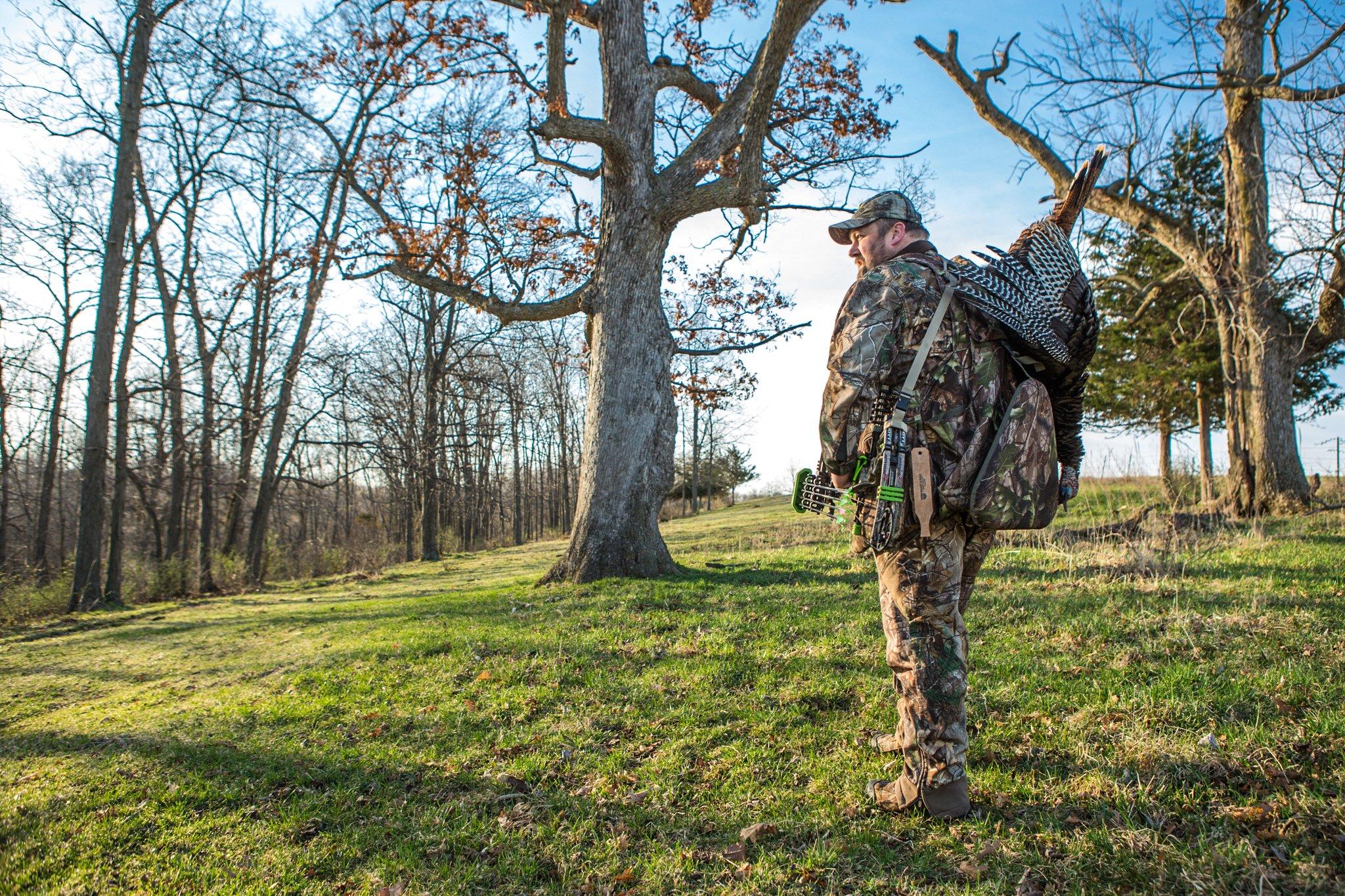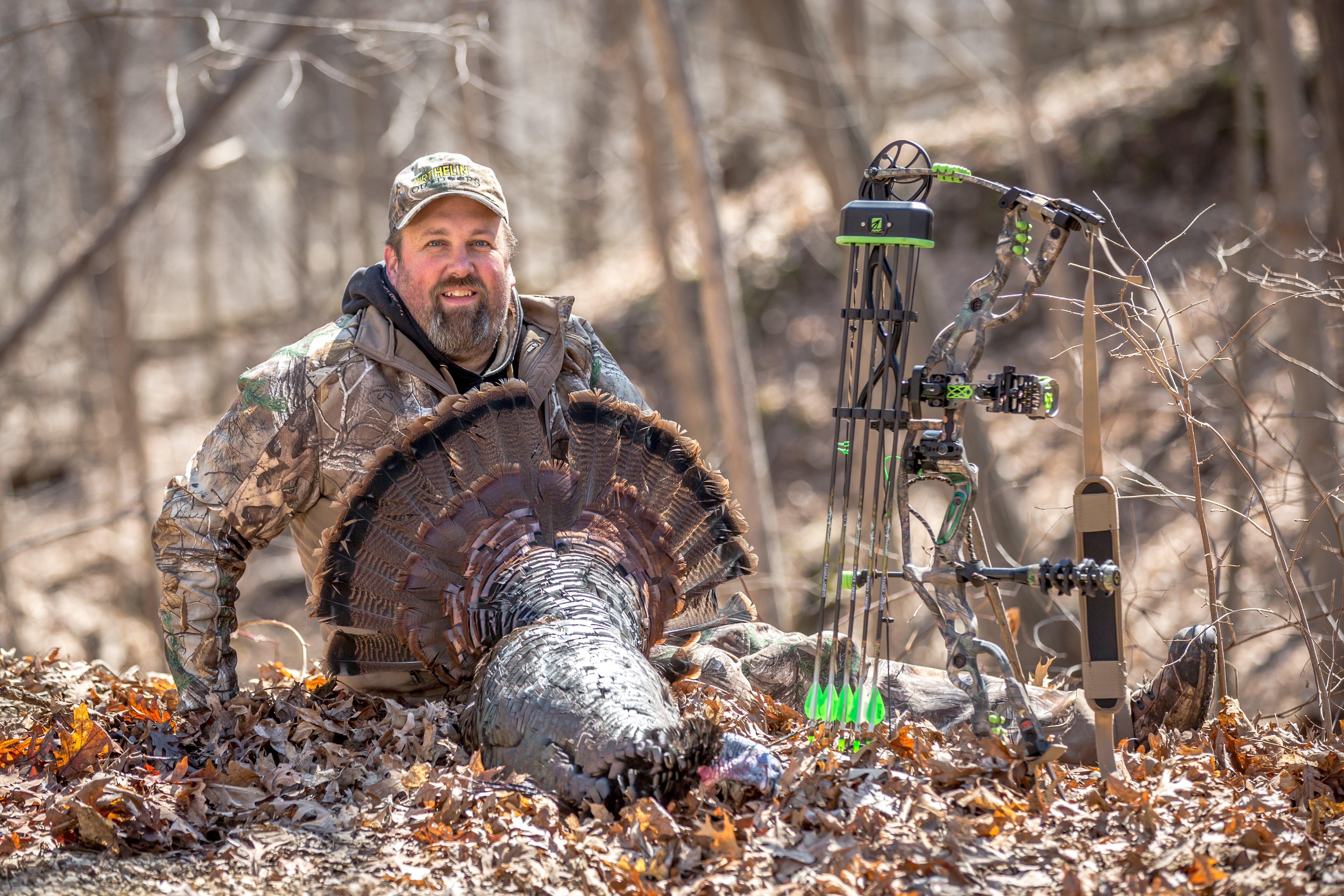Advice from Realtree Pro Staffer Art Helin
Long-awaited opening morning is here. You dreamed of turkeys flying off the roost, working toward your perfectly located tree. Your calls are prepped and waiting. Your shotgun cleaned, patterned and cleaned again. Your overloaded turkey vest is straining the coat hook by the back door. License, check. Everything is ready. What can possibly go wrong?
Let's count the ways.
What can go wrong will go wrong, said Realtree pro staffer Art Helin, so come opening morning you'd better have a backup plan.
Helin, who has hunted turkeys for 30-plus years, can recite a litany of how an opening-morning hunt can go wrong in a hurry.
- You pull in and find someone has beaten you to your public-land spot, or moves in after you're set up.
- Trespassers sneak in on your private-land spot.
- A coyote or bobcat stalks your decoys.
- A deer wanders in, catches your scent, huffs a warning and streaks off, scattering your turkey flock. (Helin tip: Follow scent-control practices when turkey hunting. Turkeys can't smell, but deer can.)
- The landowner or a neighbor decides to check cattle or work in a nearby field.
- Roost trees have blown over - or the woods have been logged off or cleared for development.
- The neighboring landowner built a house adjacent to your hunting area.
- Or everything is as you expect it, but as the sun comes up you realize there are no turkeys, nothing in the roost tree.
- Or everything is as you expect it. The turkeys are there, you're set up in the perfect location, then a storm blows in, blowing the turkeys off their pattern, away from your calling, if they can even hear your calling over the rain, wind, snow, whatever Mother Nature decided to throw at you.
Those are just a few things that can go wrong, said Helin, in a tone that makes you think he's speaking from experience.
Helin teaches what he's learned about turkey hunting through seminars. He's hunted for television and videos and used to guide paying clients, but for years now he and his wife, Michelle, have volunteered to guide special-needs and disabled hunters and new hunters through Wisconsin's Learn to Hunt program.
You can't always prevent something from going wrong, but you can be prepared, Helin said.
Plan B
You have to have a Plan B, he said, and planning your Plan B starts with scouting.
You have to scout every year, he said. One guy at a seminar told Helin he doesn't scout because he hunts the same land, his land, every year and the turkeys always roost in the same place. I said, OK, but what if a tornado came through or what if over the winter that tree died and has fallen over? Helin said. You're going to be pretty disappointed if you go back on opening day and nothing is roosted there. He said he hadn't thought of that and I said well, you don't until it happens. And I've had it happen.
If the trees are gone, I want to know that before season starts, he said. I do extensive scouting, from the edges. I don't like to get in and push birds before I hunt them, so what I'll do is scout everything with binoculars.
Trail Cameras
Or, if he goes into the woods and fields, it's to set up trail cameras. I use trail cameras, just like I do for deer, he said. Trail cameras are the biggest thing for scouting turkeys. You can set them close to the roost area, you can set them on their strut zone, set them on food sources.
Cameras will help you pattern turkeys' movements, he said. Turkeys move in a pattern just like deer, he said.
(Helin tip: Run trail cameras on video mode, not photo, so you can see and hear what turkeys are doing and how they communicate with each other.)
Once you know their pattern, you can be prepared for different scenarios throughout the day, he said. If your early morning set is messed up by a coyote or another hunter, or the roost is empty, but you know where the turkeys go in the afternoon, you have a backup plan, he said. You can say, well, according to my cameras, they are over on this property at two in the afternoon so let's get out of here and set up over there, he said. You can always come back to the original spot, assuming it's not completely blown, he said.
Also, make sure food sources haven't changed. For instance, farmland that provided a food source one year might be set aside in a Conservation Reserve Program so all of the sudden the turkeys are not going to that field to eat any more so you have to find out where they are going, Helin said.
Another basic Plan B rule is to have a backup location or locations, Helin said. If you hunt private property, get permission for more than one hunting area. If you hunt public land, locate alternative spots. If your primary spot falls through, for whatever reason, your opening day doesn't have to be ruined. Just pack up and move.
But, patience can also be a good Plan B, Helin said.
Be Patient
A lot of guys get frustrated when birds get quiet, he said. They say toms get quiet because they're educated. I don't believe that. I believe what's happening, and I've watched this for 30-plus years, is that the first couple weeks, it's all about dominance, so toms are fighting and fighting a lot; the middle of season is still jealousy, they're still fighting over hens, but I think when they get into late season they don't want to fight any more so they don't want to give away their location. They are still trying to find those hens and they are trying to sneak in because Mother Nature's told them they have a couple weeks left and then it's over. So I think those older, smarter toms come in quiet because they don't want to give away their position and end up fighting. So, he said, if you hear an answering gobble in the distance, be patient. He might be coming, quietly.
And, there are times the best Plan B is to stick with Plan A, Helin said. If you've done your scouting and you know you are in the turkey zone, don't be in a hurry to abandon it. I'm just going to sit, Helin said. You know birds are around, you've scouted them and seen them on camera and you know these birds are here and you may sit there for three, four or five hours and all the sudden a bird shows up, quietly. If you're up and moving around, all you're doing is bumping them.
Even if a coyote, deer or neighboring farmer blows turkeys out of there, they are likely to come back. They've seen coyotes, deer and farmers as part of their daily routine. It doesn't mean they are leaving the county. If that happens I'm going to sit tight, Helin said. And if I'm tired I might take a nap. After something like that, I'm going to give it at least a half hour or 45 minutes before I call. And I always start with a kee-kee run, the call of a lost bird coming back. They're going to try to find each other sooner or later.
More Tips
If it starts raining, relocate to an open field. Have a blind with you or already set up. When it rains, turkeys want to get out of the woods and into an open area. There's security in numbers and all those birds try to get grouped as tight as they can in a field somewhere until the rain is done, Helin said. All they have is your sight and hearing but in the woods it gets really loud when it rains and it's hard to see. Predators can take advantage of rainy conditions to sneak in. Turkeys know that and head for open country. As long as you have your blind set up, say, a half hour before turkeys show up, and there's no flapping windows or other movement, turkeys won't be alarmed, Helin said. Deer will freak out, he said. Turkeys won't.
Farming operations may temporarily rattle turkeys but some can attract them, Helin said. He said he's seen turkeys following a planter through a field picking at seeds. Likewise, they'll often take advantage of disking or other operations that disrupt the soil, exposing insects and worms.
Turkeys have a brain the size of a pea, Helin said, But I always say they are the smartest dumb bird in the world. I laugh when people say they are the dumbest bird they've ever seen. I say if they are so dumb, why is the national success rate only 22 percent?
Bonus Read: How to Hunt Early Season Turkeys
Go here for more Realtree turkey hunting. Follow us on Facebook.










